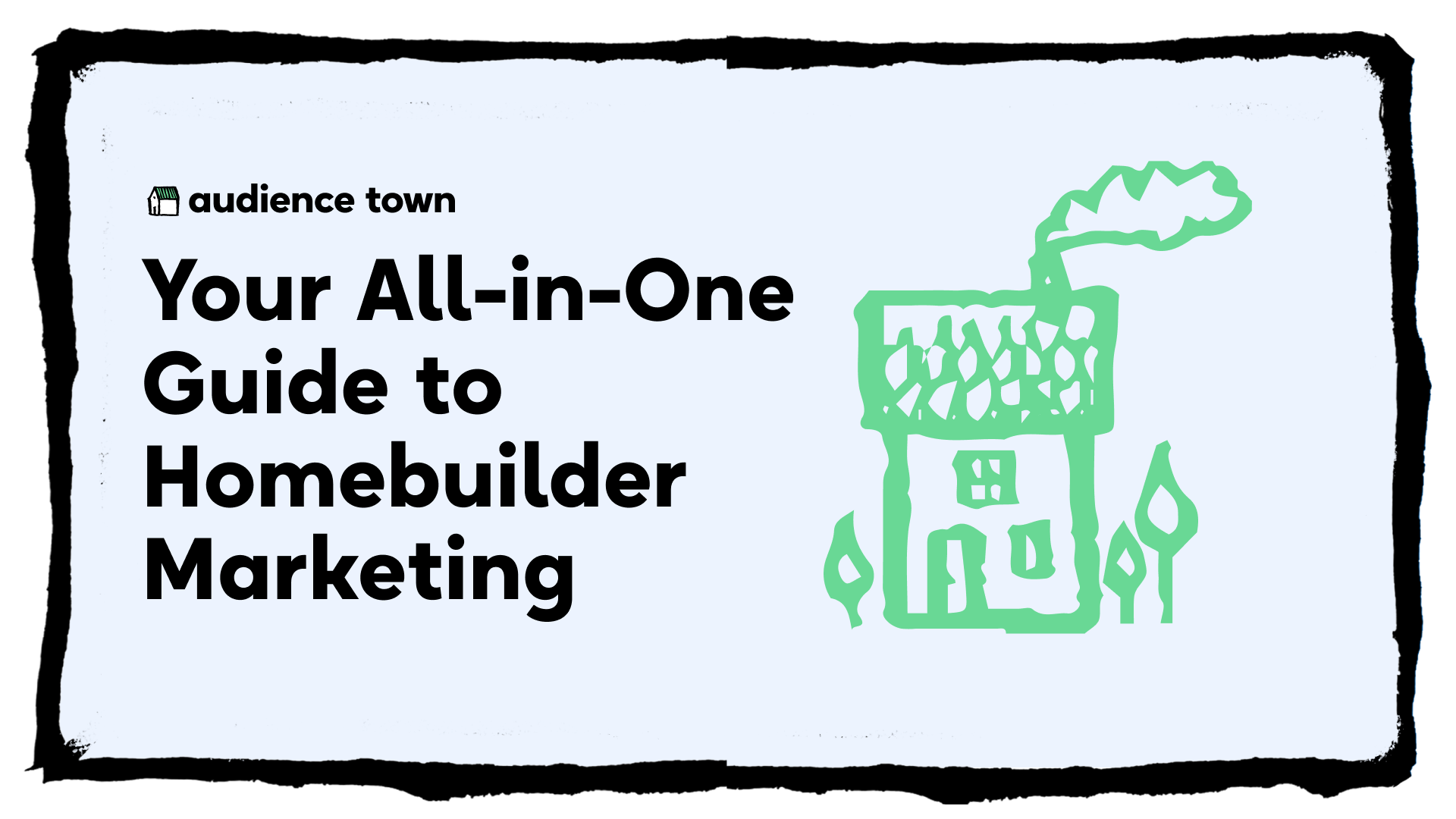Home Builder Marketing | New Construction Home Builders
Your All-in-One Guide to Home Builder Marketing
Read Time 7 mins | May 17, 2024 12:00:00 AM | Written by: Kinsey Wolf

As summer approaches, homebuilding is red hot. Demand is still soaring across the U.S. for newly constructed, single-family homes. Homebuilders are forecasting another big year ahead, with 80% planning to build more than last year. While resale inventory remains tight, the market doesn’t look to be cooling down any time soon.
Business may be booming, but marketing teams are spread thin. At this volume, any marketing misstep can be extremely costly or leave money on the table to be swooped up by your competitors. Aim high and drive results with efficient, and strategic, omnichannel marketing that demonstrates measurable wins for your team.
Here’s a snapshot of what it takes to increase performance and save on spend, improving your ROI across essential KPIs.
- Do your homework with market research to gain a deep understanding of your audience and your competition.
- Optimize your marketing channels to engage your audience and feed your funnel.
- Measure your success through KPIs and evolve your strategy for maximum impact.
For an in-depth guide on crafting a comprehensive digital marketing strategy, check out our guide and download our Real Estate Marketing Strategy Template. These will provide detailed insights into each planning component and guide you towards a successful campaign.
Understand Your Market
To engage and convert potential home buyers, try to understand exactly who they are and what they want. You’ll also need to be memorable and stand out from the competition. Begin with audience research, doing your homework and looking at the data. Get specific about your target audience, including as many details as you can think of. Use these insights to create ideal customer profiles (ICPs) and buyer personas. Getting granular here will help to attract and resonate with the home buyers you are looking for.
Audience Traits
Match your properties with the preferences of your target audience. For upscale movers, focus on high-end features like design, views, and desirable locations. If your audience consists of young professionals, focus on features like proximity to workplaces and modern amenities. For families, emphasize spacious layouts and nearby schools.
Understand the demographics, preferences, and behaviors of your ideal home buyers. Consider factors such as age, income, family size, and lifestyle choices. Dive into their psychographics by considering their motivations, aspirations, pain points, and decision-making factors. This research is an essential ingredient of your real estate marketing strategy.
Competitive Discovery
Stand out by distinguishing your offers and audience from what others are doing. Research your competitors' marketing strategies to identify gaps and explore potential niche demographics.
Tools and terms:
Real Estate Keywords
Monitor trending keywords your competitors are using for organic and paid search. Look into keyword research tools for a comprehensive breakdown.
Google Alerts
Know when media outlets are writing about your competitors, what content pops up for certain important keywords, or even what others write about you.
Manual Checking
Run organic searches with keywords you want to use and see what kind of hits you get. This may help to identify potential competitors in your area.
Social Media
Follow the general trends in the real estate market, and how your competitors are using social media, to inform your social media plan.
Real Estate Blogs
Keep up with what your competitors are writing about to inspire your own topics and differentiate your brand voice.
Real Estate Newsletters
Subscribe to your competitors’ newsletters to inform your own distinct approach.
Client Reviews
Understanding your competitors’ client feedback can help you spotlight your selling points and customer experience.
Top Digital Marketing Channels
Once you’re identified your target audience, craft your digital materials to drive interest from potential buyers you’re looking to reach.
Website
Design your site to be user-friendly, load quickly, and have mobile compatibility. To ensure visitors will have accurate pricing and listing details, keep your home listing feed up-to-date with Multiple Listing Service (MLS) through Real Estate Transaction Standard (RETS). Make it easy to see available homes and include as much information as possible beyond a basic Zillow listing.
Listing callouts:
- Community highlights
- Local areas of interest
- Image gallery
- Video tours
- Payment or financing options
Don’t forget to drive search hits with a homebuilder SEO strategy that includes:
- Data-driven keywords
- Backlink support
- Local search trends
Content Marketing
Create content that engages your target audience, provides helpful homebuyer tips, and establishes your homebuilder brand authority.
Types of content:
- Blogs
- Video tours
- Customer Testimonials
Social Media
Identify the platforms most popular with your audience, and establish a brand vibe with compelling images that makes a positive impression.
Top Real Estate Social Platforms:
Email Marketing
If you’re a homebuilder looking to engage and convert potential buyers, email marketing is a no-brainer. There’s no better way to nurture leads and drive sales. For a full breakdown, read our blog post on email marketing for homebuilders.
Popular themes:
Welcome emails
Educational emails
Community updates
New listing alerts
Promotional emails
Pay-Per-Click (PPC) Advertising
As with all real estate marketing, an airtight PPC strategy is essential to drive your homebuilding marketing funnel. To avoid costly mistakes, reach out to your network for support with Google Ads to choose the best parameters for your campaigns. You’ll need to include keywords, strong headlines, and relevant descriptions. For a deep dive, read our blog post on Google Ads for real estate marketing.
Traditional Marketing Channels
Supporting your digital-first strategy, traditional marketing channels play an incredibly valuable role in amplifying your visibility.
Print Advertising
Now that you’ve established your target audience and positioned your brand to stand out from your competition, aim for brand consistency in your print materials. Ensure your brand is instantly recognizable with high-touch visuals and strategic messaging.
Print collateral:
- Street signage
- Brochures
- Mailers
- Billboards
Event Marketing
In-person events are an opportunity to build connection and make an impression. With a clear target audience and marketing strategy, you’ll have a much easier time engaging potential buyers and expanding your industry network.
Events:
- Open houses
- Home shows
- Trade shows
- Broker presentations
Partnerships and Sponsorships
Generate leads and drive your pipeline by establishing your community involvement and building relationships with individuals or organizations connected to segments of your target market. Offer incentives for help connecting to potential buyers that you may have difficulty reaching on your own.
Parter with:
- Local influencers
- Community organizations
- Real estate brokerage firms
- Financial institutions or lenders
Leading homebuilders use data-driven approaches to enhance their marketing strategies, execution, and attribution. Our platform provides consumer intelligence - and so much more - that helps save time and money, keeping you out of trouble and avoiding costly mistakes, while improving your ROI, reducing ad spend, and driving sales like never before. Where Google Analytics falls short in real estate, Audience Town delivers actionable customer analysis for data-driven marketing wins. To learn exactly how Audience Town does this, you'll want to book a free demo.
But if you're not yet ready for actionable insights that can improve your marketing performance, keep reading. We’ll be digging into optimization next.
Optimizing Your Performance
Measuring Success through KPIs
Key performance indicators (KPIs) help to measure your success across your homebuilder marketing channels. They can validate what works and illuminate blindspots or flawed assumptions. Use KPIs to improve your marketing performance, efficiency, and growth.
Digital KPIs
- Website traffic - the number of visitors to your site and how they got there. Understand if they are new or returning visitors, and if they are potential buyers. Determine how well your website traffic aligns with your target audience to optimize performance.
- Engagement metrics - provide insights into how well your content resonates with your target audience, number of impressions, likes, clicks, etc. Determine what types of content are working best and where there is room for improvement.
- Conversion rates - the percentage of website visitors who converted into leads. Gauge the quality of your traffic and the percentage are potential buyers vs casual onlookers.
- CTR - the “click-through rate” refers to the frequency of people who click on an ad after seeing it. It is calculated by dividing the number of clicks an ad receives by the number of times it is shown. It indicates how well your ads and SEO are performing with your target audience.
- ROI - the “return on investment” is the relationship between your ad spend and revenue from those ads. To lower your ROI, you want to save on spend while increasing revenue. Accurate audience targeting helps to improve results and reduce spend.
Traditional KPIs
- Print response rates - have an average around 9%, while digital averages are closer to 1%.
- Event marketing - measure the success of your event by tracking attendance, registrations, check-ins, sponsorships, and more. If registrations and RSVPs are low leading up to your event, increase your marketing efforts to attract more interest.
- CPL - the “cost per lead” measures how cost-effective your marketing campaigns are towards generating new leads for your sales team. It is the dollar amount spent on ad and marketing campaigns to acquire a new lead. CPL tells you where your marketing is working and where it’s falling short.
- CAC - the “customer acquisition cost” measures how much an organization spends to acquire new customers. It represents the total cost of sales and marketing efforts, property or equipment, needed to sell a home to a buyer. To optimize your CAC, streamline your pipeline to become more efficient at scale.
It’s Go Time
Homebuilding marketing is taking off and this is your time to shine. Research your target audience to identify what they are looking for, their lifestyle, and other interests. Build your marketing strategy around your target audience and tailor your channels for engagement. Use KPIs to measure your success and refine your approach to scale conversions and feed your funnel.
Audience Town empowers you to gain confidence and recognition by tracking your marketing performance and proving your wins with clarity and impact. It’s a crucial step for avoiding costly mistakes from flawed targeting and strategy. To learn exactly how Audience Town does this, you'll want to book a free demo.
More traffic. Better leads.
Kinsey Wolf
Kinsey Sullivan Wolf is the Chief Marketing Officer at Audience Town, where she leads brand, growth, and go-to-market strategy for the real estate industry’s leading performance analytics platform. As a recognized expert in scaling tech companies, Kinsey combines deep marketing expertise with data-driven storytelling and a focus on sustainable growth.
